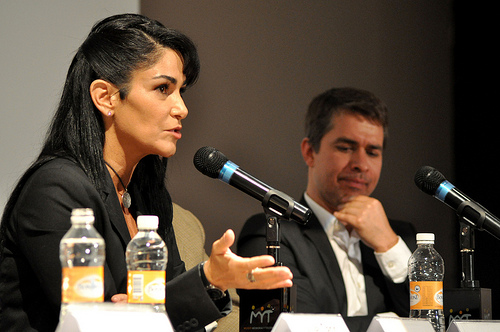Open Season on Journalists
by Horacio Castellanos Moya / August 16, 2012 / No comments
Reporting on corruption in Latin America can be a death sentence for journalists
Writers and intellectuals are no longer considered dangerous by the powerful Latin American elite. Now it’s journalists who are dangerous—especially those who investigate corruption among politicians and business magnates and expose their ties to narcotrafficking and organized crime.

- Corkscrew is focused on Latin American issues. Literature, journalism and politics are the main concerns of this column. A corkscrew is useful only if it opens a bottle, hopefully full of something that would enlighten our spirits, but we could also set loose a cruel Genie or a rotten wine. The author will follow this principle: look for topics that open debates, new perspectives, and controversy. Cheers!

- Horacio Castellanos Moya is a writer and a journalist from El Salvador. For two decades he worked as a journalist in Mexico, Guatemala, and his own country. He has published ten novels, five short story collections and two books of essays. He was granted residencies in a program supported by the Frankfurt International Book Fair (2004-2006) and at City of Asylum/Pittsburgh (2006-2008). In 2009, he was a guest researcher at the University of Tokyo. Currently he teaches at the University of Iowa.
This change has taken place over the last twenty years. When the Cold War was raging and ideological battles were being fought as furiously as a shootout, those in power still entertained themselves by terrorizing writers and intellectuals. For the most part, this meant military regimes, supported by the United States government, that waved the flag of anti-communism and ferociously lashed out at anyone who opposed them. However, at the other end of the ideological spectrum, dissident writers in communist Cuba were also forced to flee or face imprisonment.
Without the Cold War and its ideological showdowns, it seems like nobody is afraid of ideas anymore, much less a poem or a novel. The dominant ideology of the moment holds that the market rules everything, and that everything has its price. Excepting the last remaining outposts of authoritarianism, few writers today feel threatened because of their political beliefs.
But illicit business dealings with millions of dollars at stake are another thing altogether. If meddling journalists start poking around where they shouldn’t, they have to be warned. And if the warning isn’t enough, then it might be necessary to scare them. If that doesn’t do it, well, they’ve just bought their own ticket to hell.
This is just what’s happened in the case of Mexican journalist Lydia Cacho. With her first book, Los demonios del Edén (The Demons of Eden) (2005), she exposed a child pornography ring involving wealthy Mexican businessmen and politicians, among them the governor of the Mexican state of Puebla and other well-known leaders of the Partido Revolucionario Institucional (PRI). The response to the book was devastating: Cacho was jailed in Puebla on trumped-up charges without a trial, with the intention of getting rid of her once she was in prison. However, the authorities were forced to release her in the face of immediate pressure from the press and human rights organizations. In her latest book, Esclavas del poder (Slaves of Power) (2010), she takes on the issue of international white slavery and child prostitution networks. Now that some of the same PRI politicians she implicated in her book are positioning themselves for a return to power, she’s received new threats on her life that have forced her to leave the country.
Other journalists haven’t been so lucky. In Veracruz, Tamaulipas, Nuevo León, and many other parts of Mexico, they’ve been tortured and murdered without warning. The same often happens in Honduras, Brazil, Colombia, and Guatemala. Journalists are routinely threatened in a number of other countries as well.
Investigative journalism into the innermost workings of power—writing known in the English-speaking world simply as “nonfiction reporting”—can lead to death in some parts of Latin America. Seeking out the truth and then talking about it can cost a journalist his or her life.
The almost total impunity surrounding the repression of journalists only emphasizes the most glaring flaw of democracy in Latin America: Corrupt and inefficient judiciaries are all too often complicit with politicians and business magnates linked to organized crime.





